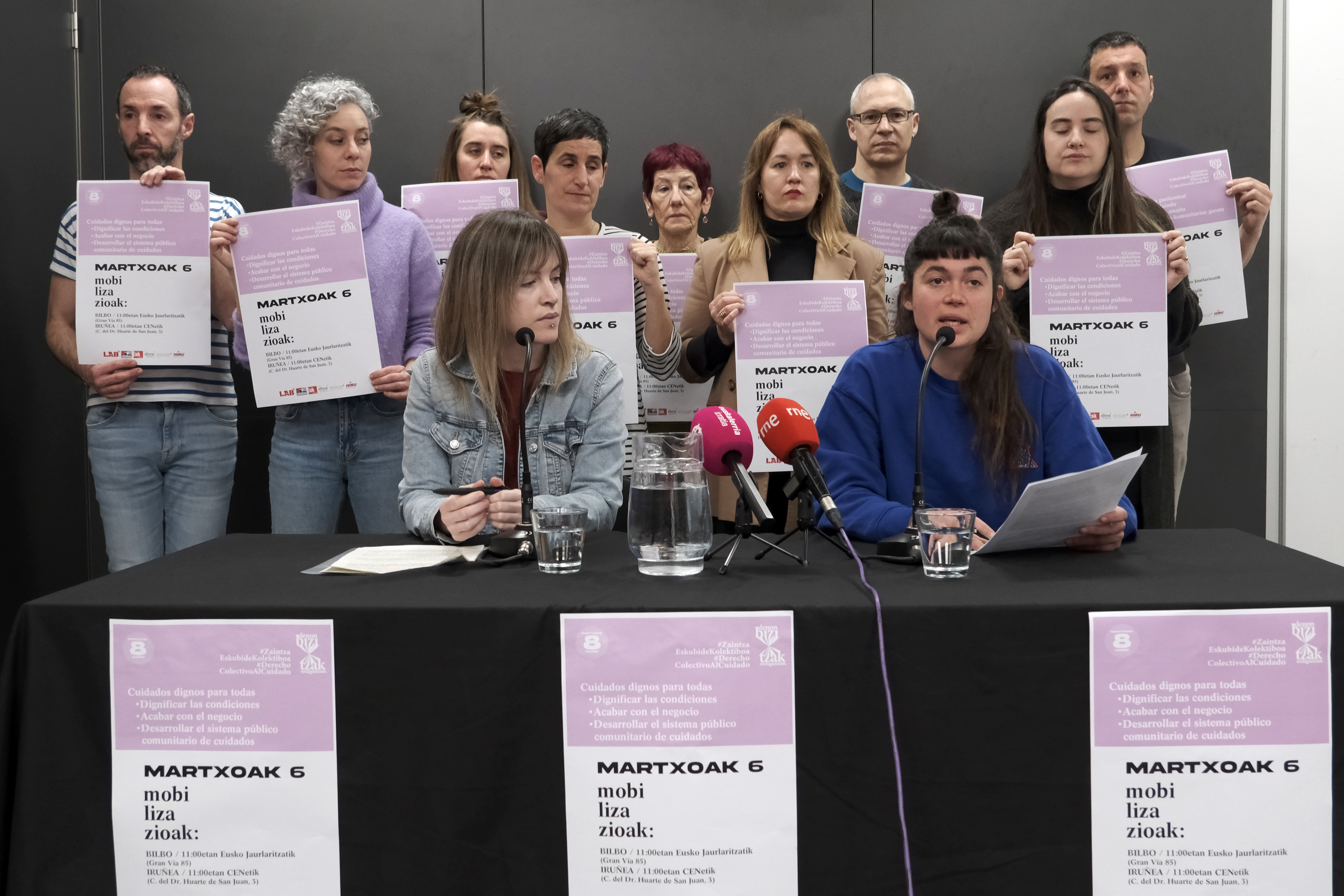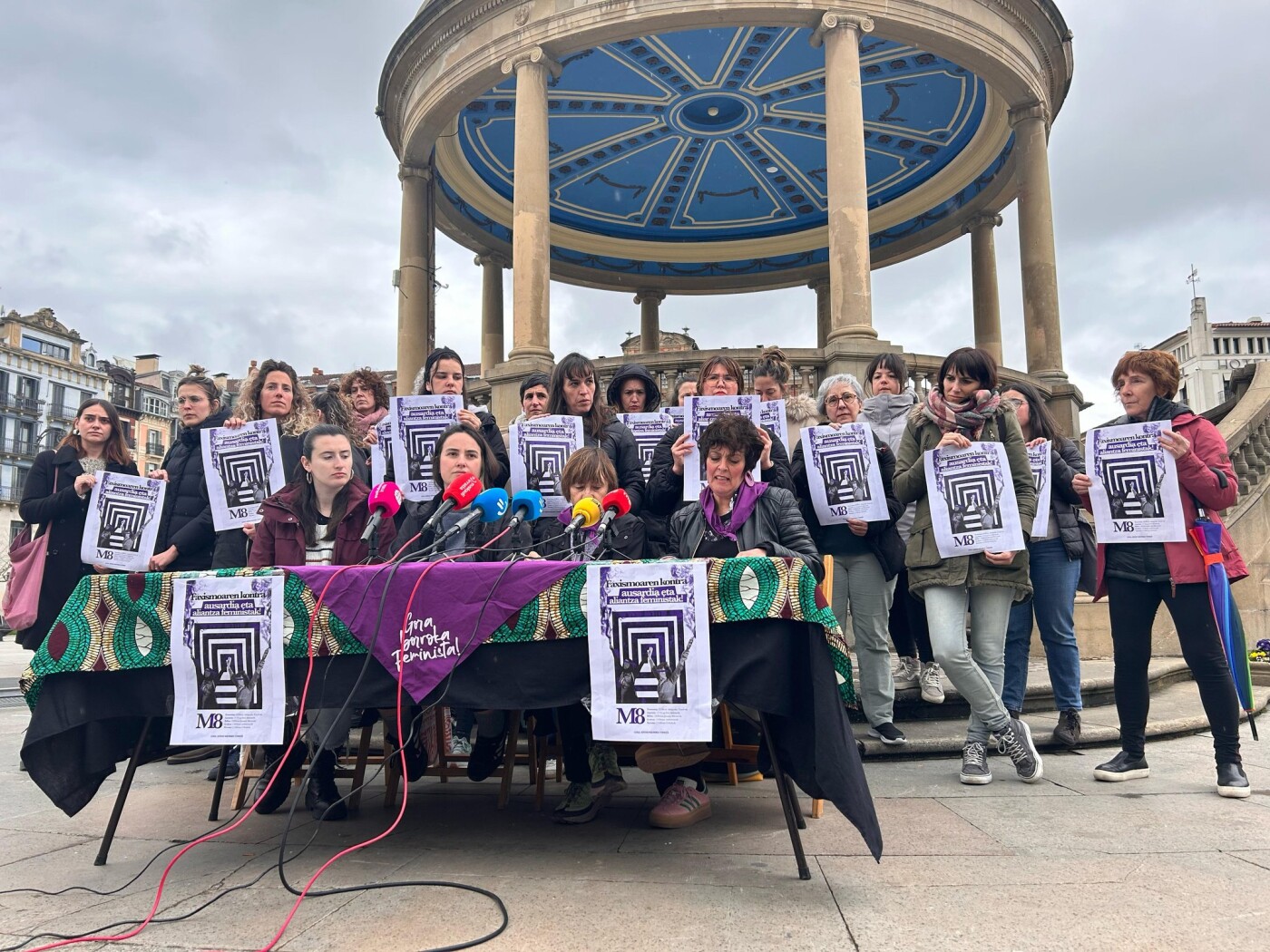“Advancing women’s rights generates reactionary positions in all areas”
- The lights and shadows he lived in his childhood caused Ángela Rodríguez ‘Pam’ (Pontevedra, Galicia, 1989), Secretary of State for Equality of Spain, to commit himself against male violence. He participated in the 15M movement, was secretary of Podemos Galicia and in 2015, at the age of 25, he came to the Spanish Congress, being the second list head of the En Marea coalition. We have been agreed in the Ministry of Equality to engage in extensive dialogue.

Leaving aside media noise, we go back in time. When and how was his political socialization?
At home politics has always been present. I have been able to follow the political debates closely since I was young. I remember that it was small that we were always on television, for example, debates about the state of the nation. I am the daughter of socialist voters, who after voting at home for Felipe Gónzalez, were disappointed in the second term of Zapatero. This clearly marked my political socialization, in a vision that I later built around the country [Spanish state].
He came to the Spanish Congress in 2015. How did that jump into institutional policy?
Hagitz was young and shocking. Not only because it's a masculinized field, but also because it's an adult. When you're 25, you're far away from maturity. The adaptation process was important and, at the same time, completely different from the political socializations experienced previously; a feminist assembly has nothing to do with preparing a conference for congress. I have memories of a lot of emotion and hope, but also of insecurity… I certainly had the imposter syndrome.
In October 2021, he was appointed Secretary of State for Equality and Against Gender Violence. What did it look like this first year?
We are picking up the fruits of the effort made. Ending 2022 with the sexual freedom law, with the reform of the abortion law, with trans law, and the implementation of the Coresponsibility Plan for the second year means that we are implementing the program. I'm proud of the feminist agenda we've set.
Some believe there is a media campaign against the Ministry of Equality. To what extent does this noise eliminate the advances it mentions?
On the contrary, in recent times there is often no talk of progress and setbacks of women. Feminism has become one of the most important debates in our country, if not the most important. Every debate that opens up has an answer, and it's so hotel-like that noise sometimes seems to choke everything else. But if I had told me a couple of years ago that trans law or menstruation permits would kill newspaper covers, I wouldn't have believed. This reflects the hegemony of feminism practiced by the Ministry.
“They insult us because we are feminist women with positions of power”
Social media also influences this. They have allowed many women who so far lacked space, but they are also the rich land of hatred. How do you take it?
Ambivalent. I try to understand what happens to us because we are feminist women and that violence is therefore a collective and structural problem like all forms. I also try to play with humor because it is an essential tool to manage insults. But it's clearly painful. They insult me because I'm obese and ugly, and of course, there are days when it's harder to see me in the mirror because on Twitter they offend you a thousand times. This has a direct impact on mental health and cannot be overlooked. However, we have managed to conceptualize this violence that we suffer: it does not happen to us because we are concrete people, but because we are feminist women with positions of power.
Last week you incorporated an amendment to the reform of the penal code, in line with the law "It's just yes." What is this agreement?
It is a modification of the explanations of the reasons for the Penal Code that confirms what the decree of the Office of the Attorney General of the State says. In other words, there is the current transitional law, and as long as the criminal sections are the same they cannot be reduced. With this measure, the Government wishes to show that interpretations of its own accord predominate among several judges.
These interpretations have given rise to controversy over the release of several aggressors.
Yes, but it's basically a political problem. The standard is firm and needs to be implemented. As in all laws recognizing women’s rights, it takes time to adjust the application of the rule. When the Law on Gender Violence was approved in 2004, 180 resources were submitted, which for many years was not implemented because it presented unconstitutional resources. So you could say the law was wrong. On the contrary, it became clear that an area of the judiciary had mistrust in the application of laws protecting women’s rights. The same situation has now been repeated. Clearly, in all areas, the advancement of women’s rights often leads to reactionary positions.
According to journalist Ana Requena, in this controversy they lost the opportunity to pedagogy against punitivism. What do you think?
On the one hand, the Penal Code should be a tool, also for feminism. For many of the women assaulted, prison sentences are inevitable in order to carry out a process of justice, truth and reparation. Feminists can't decide what kind of repair a woman needs. It is unfair. On the other hand, the controversy of punitivism puts the extreme right on the desktop, not us. On the contrary, therefore, this reform of the Penal Code seeks to provide judges with tools to overcome this impunity and prosecute crimes of sexual freedom. Therefore, rather than insisting on the debate on punitivism, as the VOX does, let us try to analyse why a judge considers that masturbating a man in public transport before a woman is not a crime. It must be persecuted and it can be feminist.
.jpg)
Finally, trans law has been passed by Congress.
It has been a terrible process. It has caused great disappointment because the LGTBIQ+ group has seen the socialists have doubts. Above all, because the PSOE was always the political party that did the most in Spain to advance the rights of the collective. It has also become clear that the debate between institutions, civil society and cultural actors is possible when there are common objectives. Trans law would not be possible without the Ministry of Equality, but not without every inch that the LGTBIQ+ movement has fought in the law, neither without the Venom series or without the female transgressions of Carla Antonelli, Mar Cambrollé or Marina Sáenz. In this struggle we have left many feathers.
Some groups called feminists are opposed to the law because they say it eliminates women. What do you think?
Transphobia, like all hate speech, has no place in feminisms. Feminisms are plural and must accept the debate, but it is incomprehensible. I insist, discussing the human rights of citizens cannot have any place in a democratic project such as feminism.
With the abortion law, for the first time in the history of Spanish democracy, they opened a participatory process.
The truth is that we have opened a participatory process in all the laws that we have worked on in the Ministry. I insist, because we have often received criticism, because in the Ministry we do not listen or make social actors self-critical. But all public consultation processes are in transparency, and anyone can see that laws have changed through the input of citizens and collectives.
As for the abortion law, it was important for us that women and doctors meet at the same table. This interview is inevitable because the law affects the rights of women and the medical community. It's been an interesting law-improvement process.
Finally, they have not included obstetric violence. Do you worry?
Yes, I am concerned, because above all the PSOE is so afraid of making that decision that it is fundamental. The presence of obstetric violence in Spain has been denounced by many women and also by CEDAW of the United Nations (UN). I think it is a matter of time, as has happened with many other things, the PSOE gets on the mark and will recognise that it is inevitable to protect women from this practice.
“Feminisms are plural and must accept the debate, but transphobia does not take place, it is incomprehensible”
The problem is that, in the meantime, the rights of multiple women in hospitals are being violated. Spain has two sentences, after ten years of fighting, the UN gave Nahia Alkorta its name in July. How can one understand that negationism and impunity still prevail in Spain?
All this explains the need for a political party like Podemos. The PSOE rules worse when it is alone, it is used to complying with only a small part of the programme it proposes. And all of a sudden a part of the public asks him to implement the entire program. Probably, if the PSOE complied with the integrity of its program, there would be no parties to its left, or very few and radical. Our task is to remind the Socialists that there are policies that are impossible and that we will not comfort ourselves with being in the institutions, that we will push for change.
Do you understand irritation in activism for respectful delivery?
Of course, and I reiterate that it was a decision of the PSOE.
But what are they going to do to end that impunity?
Our commitment remains, we are going to dialogue with the Ministry of Health, as far as possible, to legislate at least in defence of women’s rights. In 2007, the Ministry of Health promoted the Normal Delivery Care Strategy, which was not met either. He proposed that to ensure a respectful delivery it was essential to place women in the center, reducing among other things episiotomies and cesarean sections. We need a Health, Sex and Reproduction strategy that, through the actions included in the abortion law, builds a common protocol that is complied with in all hospitals.
Attorney Francisca Fernández Guillén explains that compliance with the UN recommendations is the first step to reject obstetric violence. Nor do we need to go through Parliament because it is a legal system. Why not?
Because there is no political will. I insist, the PSOE does not want.
As for maternity, equal rights was a step forward. However, there is a part of the population that has been censored because the permits of relatives have been frozen for three decades, despite a historic change in prolongation.
Equal and non-transferable permits are a useful tool to close the existing cracks between women and men. Data indicate that more and more men have processed permits, so we consider it important to continue working in this direction. We wanted this law to extend the permits of single-parent families to have the weeks of the second parent, but we have not convinced our partner.
The World Health Organization (WHO) recommends exclusive breastfeeding for the first six months. It is incompatible with a sixteen week permit.
Our proposal was to extend from sixteen to 24 weeks, and we have not succeeded either, but we hope that the law will come to Parliament with this compromise. It is true that the president of Spain has on several occasions ratified that it is enough with sixteen weeks, although the WHO recommendations contradict it.
Finally, what is the relationship with your government partner?
It often seems that we are a free line of government and it is not true. Of course, behind all policies there is a permanent debate and a great deal of work. It is true that in Spanish political tradition this is new. Clearly, however, the Ministry of Equality will be the one that, at the end of the legislature, can say with greater pride that it has fulfilled the political agenda. I do not think that is possible for all ministries.
.jpg)
Martxoak 8an egindako pintaketak gainetik margotu dituzte ikur faxistekin Zuberoako hiriburuan. Horren aurrean elkarretaratzera deitu dute, astelehenean.
Martxoaren 8a Getxo bere bizitokian igaro du: kumbia dekolonial eta antiarrazista topaketa antolatu du Algortako Herriko Tabernan, Abianen, Hija del Nopal DJrekin batera.
Argentinatik Getxora migratu zen Celeste Agüero, kantutegi herrikoi batekin eta poesia xuxurlatzeko... [+]
Mugimendu feministak manifestazioak egin ditu goizean Donostian, Gasteizen eta Iruñean eta arratsaldean Baionan eta Bilbon. Oinarrizko irakurketa partekatu dute, eta horri gehitu diote hiri bakoitzean bertako problematika, eragile eta ekimenen erreferentzia.
Bilgune Feministak Heldulekuak argi, Euskal Herria feminista leloa baliatu du M8an, azpimarratzeko feminismoak ematen dituela “datorrenari aurre egiteko tresnak”, eta gogorarazteko faxismoaren gorakadaren testuinguru hau helduleku horretatik irakurri eta borrokatu... [+]
MAITE: (biharko eguna antolatzen bere buruaren baitan) Jaiki, gosaldu, bazkaria prestatu, arropa garbitu, etxea garbitu, gizon hori jaiki, seme-alabak jaiki, hiru horien gosaria prestatu, haiek agurtu, erosketak egin, lanera joan, seme-alabak eskolatik jaso, merienda eman,... [+]
Festa egiteko musika eta kontzertu eskaintza ez ezik, erakusketak, hitzaldiak, zine eta antzerki ikuskizunak eta zientoka ekintza kultural antolatu dituzte eragile ugarik Martxoaren 8aren bueltarako. Artikulu honetan, bilduma moduan, zokorrak gisa miatuko ditugu Euskal Herriko... [+]
“Kasu, ez gitxu lo!”. Gure denbora eta manerekin baina heldu gira.
Azaroaren 25ean Baionako elgarretaratzera joan ez joan eta autoak nola partekatu pentsatzetik (joan-jina bi oren), bat-batean Lartzabalen elgarretaratze bat antolatu genuen, eta 47 emazte bildu!... [+]
Martxoaren 8a, Emakumeen Nazioarteko Eguna, munduan zehar milioika emakumeontzat berdintasuna, eskubideak eta justizia eskatzeko borroka eguna da. Hala ere, gerrek, gatazkek eta politika militaristen hazkundeak markatutako testuinguru global batean, inoiz baino premiazkoagoa da... [+]
Nahiz eta Nazio Batuen Erakundeak (NBE) 1977an nazioarteko egun bat bezala deklaratu zuen eta haren jatorriaren hipotesi ezberdinak diren, Martxoaren 8aren iturria berez emazte langileen mugimenduari lotua da.
Euskal Herriko Bilgune Feministak deituta elkarretaratzea egin dute Hernanin Iratxe Sorzabali elkartasuna adierazi eta "babes osoa" emateko. Inkomunikatuta egon zen uneak berriz ere epailearen aurrean kontatu behar izatea, "bizi izandakoak utzitako ondorioen... [+]
Lantzeko inauteri txikien kalejira ikusle guztien begietara urtero modukoa izan zen. Txatxoak, Zaldiko, Ziripot eta Miel Otxin herriko ostatuko ganbaratik jaitsi eta herritik barna bira egin zuten txistularien laguntzarekin. Askok, ordea, ez zekiten une historiko bat bizitzen... [+]
Martxoaren 6an 11:00etan Bilbon eta Iruñean mobilizazioak egingo dituzte sindikatuek, patronalak eta Eusko Jaurlaritza zein Nafarroako Gobernua interpelatzeko, zaintza eskubide kolektiboari dagokionez.
Martxoaren 8a hurbiltzen ari zaigu, eta urtero bezala, instituzioek haien diskurtsoak berdintasun politika eta feminismoz josten dituzte, eta enpresek borroka egun hau “emazteen egunera” murrizten dute, emakumeei bideratutako merkatu estereotipatu oso bati bidea... [+]
Martxoak 8a heltzear da beste urtebetez, eta nahiz eta zenbaitek erabiltzen duten urtean behin beren irudia morez margotzeko soilik, feministek kaleak aldarriz betetzeko baliatzen dute egun seinalatu hau. 2020an, duela bost urte, milaka emakumek elkarrekin oihukatu zuten euren... [+]






















